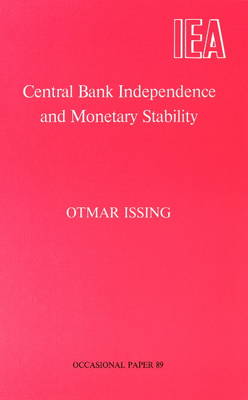Central bank independence is now a major issue in debates about institutional reforms designed to improve economic performance. Professor Issing's paper is notable for its scholarly discussion of the meaning of 'independence' and his analysis of its effects. Moreover, because of his position inside the Bundesbank which is among the most independent of central banks and which provides a model for the constitution of the proposed European Central Bank he writes with a degree of expertise not available to most authors. Interest in central bank independence arose from the world-wide acceleration of inflation in the 1 970s which stimulated interest in means of 'anchoring' anti-inflation policy. Germany was in advance of other countries in recognising the importance of price stability and es-tablishing an institution to produce it, making the Bundesbank independent in 1957. Professor Issing argues that when independence is coupled with a price stability objective, economic performance appears to improve. Not only is inflation lower, but there is evidence that real growth is higher.
In his view, central bank independence comes 'top of the list' of institutional arrangements designed to safeguard the stability of money.
- ISBN10 0255363222
- ISBN13 9780255363228
- Publish Date 19 June 1993
- Publish Status Out of Print
- Out of Print 23 June 2014
- Publish Country GB
- Imprint Institute of Economic Affairs
- Format Paperback
- Pages 36
- Language English
